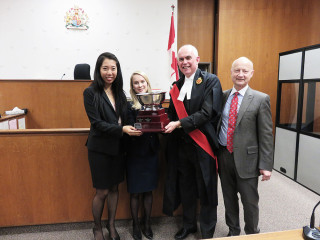Released October 27, 2015 | Decision [CanLII]
This case concerned a damages trial following an April 2010 motor vehicle accident. A number of issues arose over the course of trial. The Plaintiff’s physiatrist provided opinion on a matter not contained within its report. Furthermore, during the closing address, Plaintiff’s counsel attacked the integrity of defence counsel, the defendant, and a number of defence expert witnesses. The Defendant requested a mistrial, which was refused by the Trial Judge. The Defendant also asked for a trust order and assignment of the Plaintiff’s accident benefits for future care costs. This was also refused.
The Defendant appealed. There were four issues on appeal. All issues were decided in favour of the Respondent. They were:
- Did the Trial Judge err in failing to grant a mistrial?
- Did the Trial Judge fail to give a proper correcting instruction to the Jury?
- Did the Trial Judge err in allowing the Plaintiff’s physiatrist to comment on a matter not contained in its report?
- Did the Trial Judge err in failing to impose a trust order and assignment over the Plaintiff’s accident benefits relating to future care?
On issue number one, Laskin J.A. commented that counsel’s duty of zealous advocacy allows for wide latitude in the closing address. However, despite this wide latitude, counsel should refrain from “impugning the integrity of opposing counsel” and its client. Despite this comment, Laskin J.A. concluded that “a mistrial is a remedy of last resort”. It should only be ordered where a correcting instruction cannot cure the prejudice created by counsel’s questionable comments. Furthermore, a mistrial is a discretionary remedy. Therefore, a Trial Judge’s decision to grant/not grant a mistrial will attract considerable deference from appellant courts. In this case, there were only a few questionable comments, which were all countered by a correcting instruction. Laskin J.A. did not find any substantial wrong or miscarriage of justice.
On issue number two, the Appellant argued the Trial Judge did not go far enough with its correcting instruction. The Appellant argued the Trial Judge should have condemned counsel’s comments. Laskin J.A. disagreed. The Trial Judge told the Jury that counsel’s comments were “wrong”. There was no need to expressly condemn the comments. Further, the Trial Judge was clear that the Jury should focus on the evidence and not the comments of plaintiff’s counsel at trial. In reaching this decision, Laskin J.A. set out the four components of a proper jury instruction. A proper correcting instruction should: [1] be clear and unambiguous; [2] point out to the Jury the offending comments; [3] explain that [the] comments are improper and why they are [improper]; and, [4] instruct the Jury to disregard the comments and base its findings and decision solely on the evidence.
On the third issue, Laskin J.A. was asked to decide whether the Trial Judge erred in allowing the Plaintiff’s expert physiatrist to comment on an incident not mentioned in its report. For Laskin J.A., the Trial Judge did not err in allowing such questions. Both parties were aware of the other’s theory on the incident in question. Moreover, one defendant expert witness had already provided an opinion on the incident in question. Therefore, it would be unfair to the Plaintiff if its expert were not allowed to comment on a well-documented incident.
The final issue was whether the Trial Judge erred in failing to impose a trust order assigning the Plaintiff’s statutory accident benefits for future care. Laskin J.A. summarized the principles applicable to imposing a trust or assignment as follows:
- “The Jury award must mirror the collateral benefit sought to be assigned”; and,
- There must be no uncertainty about the entitlement to, or quantum of, the collateral benefits. There must also be no uncertainty about the extent to which the Jury award mirrors the collateral benefit sought to be assigned.
In this case, the award did not allow the Trial Judge to determine the extent to which the Jury’s future care award mirrored the Plaintiff’s entitlement under its accident benefits policy. Therefore, Laskin J.A. held there was no error in failing to impose a trust or assignment.
The Appeal was dismissed.














